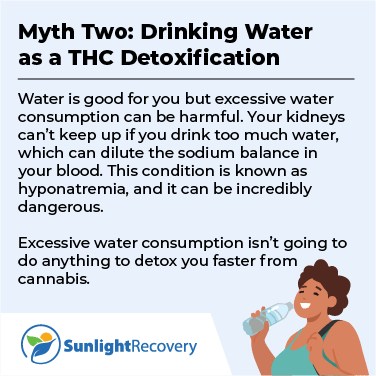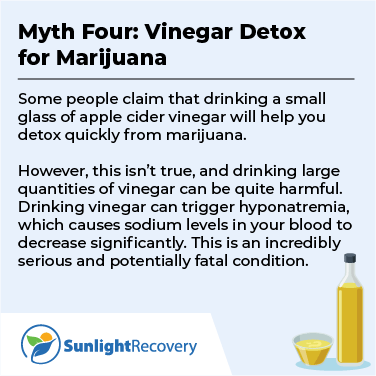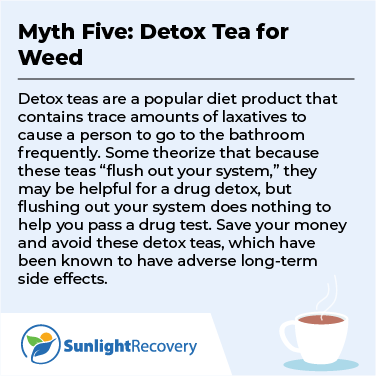Cannabis use is common across all walks of life. According to the 2022 National Survey on Drug Use and Health, more than half of all U.S. adults report having tried marijuana at some point in their lives. If you’ve been using cannabis and would like to get it out of your system quickly, you’ve probably heard of numerous fast cannabis detox methods from friends or online communities. We’re here to explore a few of those options and look at which ones really work and which are just going to leave you tired and grumpy!
Myth One: Sweating as a Cannabis Detox
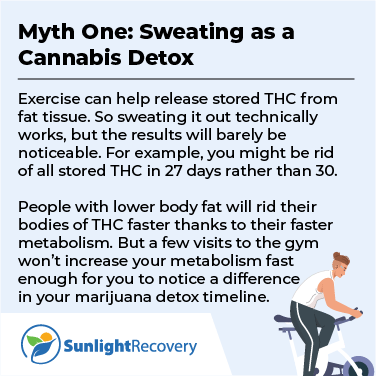
The idea of trying to “sweat out toxins from your body” isn’t a new one. This recommendation seems to be given for all kinds of substances — you’re told to sweat out alcohol, a bad diet and marijuana.
This advice is partially true — exercise can help release stored THC from fat tissue. So, sweating out THC (the psychoactive compound in cannabis) technically works, but the results will barely be noticeable. For example, you might get rid of all stored THC in 27 days rather than 30. That’s probably not fast enough for it to be worth the effort.
THC is stored in the body’s fat cells, and people with lower body fat levels tend to get rid of THC more quickly than those with more body fat. That could be a good excuse to start hitting the gym regularly. Unfortunately, a few visits to the gym won’t increase your metabolism fast enough for you to notice a difference in your marijuana detox timeline.
Myth Two: Drinking Water as a THC Detoxification
In addition to sweating it out, we’ve all heard the advice to “flush it out.” Just drink enough water, and any alcohol or drugs in your system will disappear, right?
Wrong.
THC is hydrophobic, so it isn’t absorbed by water to be flushed out of the body. Secondly, while water is good for you and essential to your overall physical health, excessive water consumption can be harmful. Your kidneys can’t keep up if you drink too much water, which can dilute the electrolyte balance of your blood. This condition is known as hyponatremia, and it can be incredibly dangerous.
On top of that, excessive water consumption isn’t going to do anything to detox you faster from cannabis. And if you’re asked to take a urine drug test, there’s a chance your urine will be so diluted that it’s missing expected enzymes, and you’ll be told the sample is unacceptable.
Myth Three: Cranberry Juice Detox
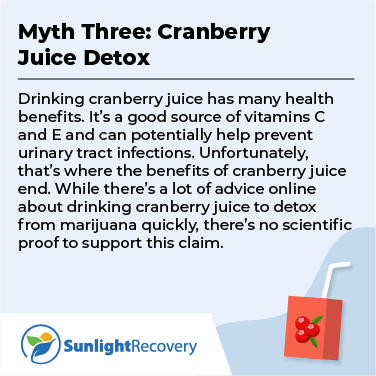
Myth Four: Vinegar Detox for Marijuana
Apple cider vinegar has become popular in the wellness and nutrition community. People are boasting about all the benefits of drinking it, with some claiming that drinking a small glass of this acidic concoction will help you detox quickly from marijuana. However, this claim is unproven, and drinking vinegar can be harmful because it increases the risk of hyponatremia, which can be potentially fatal if not properly treated.
There’s no evidence apple cider vinegar helps you detox from cannabis, so feel free to skip even trying this method.
Myth Five: Detox Tea for Weed
Detox teas are a popular diet product containing trace amounts of laxatives, designed to cause a person to go to the bathroom frequently. Some theorize that because these teas “flush out your system,” they may be helpful for a drug detox.
As we’ve already stated above, flushing out your system does nothing to help you pass a drug test. THC is hydrophobic and is stored in your body’s fat cells, so flushing out waste from your digestive tract won’t make a difference in the level of THC in your bloodstream. Save your money and avoid these detox teas, which have been known to have adverse long-term side effects.
Myth Six: Weed Detox Kit
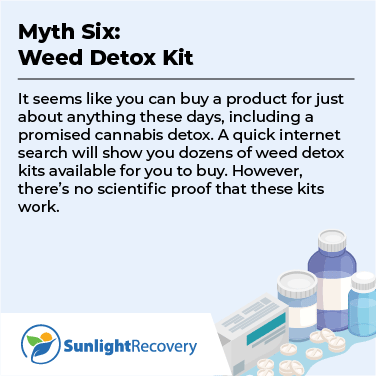
Myth Seven: Weed Isn’t Addictive, So There Are No Withdrawal Symptoms
One of the biggest misconceptions when it comes to marijuana use is that it’s not addictive, so it doesn’t have any withdrawal symptoms. In reality, both of these ideas are incorrect — weed is addictive, and it can trigger withdrawal symptoms.
According to the NIH, studies show that as many as 30% of people who try marijuana end up having a marijuana use disorder, so the drug is quite addictive. Potential withdrawal symptoms when coming off of frequent marijuana use include:
- Aggression
- Mood swings
- Anxiety
- Depression
- Insomnia
- Restlessness
- Changes in appetite
- Vomiting
- Abdominal pain
- Headaches
Know that anyone telling you that cutting off marijuana use isn’t challenging or doesn’t have side effects is misguided. Marijuana abuse disorder is treatable, but professional help is often the best solution.
Myth Eight: Cannabis Is Completely Safe
Many people assume cannabis is completely safe, working on the assumption that a natural substance can’t be harmful. This misconception could be leading a generation of recreational cannabis users to do lasting harm to their bodies. In the short term, smoking cannabis raises your heart rate and has an impact on your cognitive ability. One of the appealing impacts of THC is the feeling of euphoria many users experience. However, this can turn into anxiety and paranoia when the euphoric phase passes.
Young people who use cannabis may experience impaired cognition, poor sleep quality and impaired driving ability. Some young cannabis users become aggressive while under the influence instead of experiencing the mellowing effects more commonly associated with the drug. In addition, those who smoke cannabis are exposing themselves to tar and carbon monoxide at higher levels than those found in tobacco cigarettes. Long-term cannabis smoking can lead to respiratory issues similar to those experienced by long-term cigarette smokers.
Cannabis users may not be at risk of overdosing on the drug in the way those who use other “party drugs” are, but that doesn’t mean cannabis, whether vaped, inhaled or eaten, is a completely safe substance. It can be habit-forming, and some of the effects of marijuana are undesirable.
Marijuana Use Treatment Options
Until recently, marijuana was seen as a safe drug, with its most significant risk being a gateway drug. We now know that even if someone never proceeds to harder drugs, marijuana use has many downsides.
If you or someone you love is struggling with excessive marijuana usage, getting help is essential. Long-term marijuana use can potentially lead to adverse side effects in the brain. Most notably, marijuana use can cause permanent psychological disorders, including anxiety, paranoia, cognitive impairment and psychosis.
Luckily, the condition is highly treatable. Treatment options include support groups, medicine, one-on-one counseling and drug rehab programs. The sooner a person seeks professional help, the sooner they can take back control of their life.
Marijuana Treatment at Sunlight Recovery
Sunlight Recovery offers detox and residential substance abuse treatment programs. You don’t have to waste your time and money on detox myths that won’t achieve anything. If you’re ready to detox from marijuana the right way, contact us today to find out how we can help.



